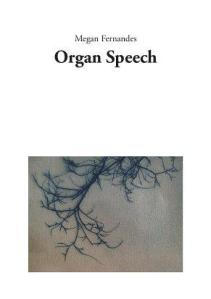‘Organ Speech’ by Megan Fernandes
-Reviewed by Charles Whalley–
From the Paris-based Corrupt Press, the unremarkable cover of Megan Fernandes’ Organ Speech hides a remarkable collection of poems that are mature, intelligent and bold, ranging over family, memory, desire, botany, neuroscience, Anglo-Saxon poetry, The Troubles, and Alice in Wonderland . The best description of her surreal style is perhaps (to borrow something else) ‘cognitive poetics’, as she exploits the synaesthetic and associatory possibilities of language. The best poems in Organ Speech, such as ‘Here is earnest’, are those in which language itself seems to dictate the content. It takes a poet with a very keen and free awareness of words, the “recipes for moods” – the objective correlative? – , to produce tremendous lines which seem to produce considerable effects entirely out of themselves, like “Teach me about / ghosts and abstractions, / and the caffeine of wrecked space.” (‘Here is earnest’)
For Fernandes, language and thought map on top of each other, and so in many of the poems, and in her dominant mode, she dramatises or allegorises thought to create fantastic (in the proper sense of the word) landscapes and uncanny images where language is the primary logic. So, for instance, in the opening ‘Synaptic Space’, suicide by a gun becomes a way to project “your synapses” across (or on to) the universe, making the mind a microcosm of space (or space a macrocosm of the mind) where you can “[f]ollow the scent / of your childhood pajamas, they smelled something sweet and / deranged: measles, beetles, and boxed apple juice”. The individual becomes an explorer within their own thoughts, which have been stretched out and rendered tangible or spatial. In ‘THE BRAINHOOD ADVENTURE!’, Fernandes starts this exploration by opening the poem with “Eyes turn inwards”, to use the idea that we could look at our own brains to introduce an allegory of thought, desire and memory, mixing the literal morphology of the brain with a dream-like fantasy journey; for example:
‘Beside the swing, on the spongy terrain,
I take you to meet Ida in the Cannibale café,
in the parietal northwest corner of the brain.’
We are simultaneously in the spongy brain and in Paris, and not really in either. Because the events are fantastic the reader can’t create a mental picture independent of the text, and so almost complete agency is given to language. This gives a sense of freedom and of infinite possibility.
The surreal brainhood adventures provide an effective training ground for when Fernandes attempts more concrete topics. A poet who knows that violet “makes grief / but never quaintness or purposeful”(‘Here is earnest’) can produce lines as perfect as “give me / dead lavender and raw milk”(‘Corinne on Bodies of Water’). In the sinister and unnerving ‘Queens’, for instance, which is about hijra in Mumbai, the heart of the poem is provided by a sudden flash of the surreal:
‘They stir me through female nightmares: ash-heaps, fields of limbs, everything in
twos.’
The “nightmares” give a pretext for the uncanny images that follow. (Although the more I read that line the more “stir” seems like the cleverest part of it.) In ‘Archives’ and ‘Hallways’ Fernandes writes about her family, and the mental richness that these subjects provide a landscape in which she can invigorate concrete topics with little flashes of the surreal (often, again, with the pretext of ‘imagining’ or ‘dreams’).
On the other end of this, the poems sometimes falter when they become fixed in the concrete, as is the case with ‘Grendel’, for instance, which is about a murder, and the victim’s sympathy for the culprit. (The ‘pretty murder victim’ theme is a bit LiveJournal.) Fernandes is perhaps a bit too insistent upon the strength of the reality of the moment, and doesn’t seem to want to let language get in the way. As a result, the poem is like the dragons in ‘Here is earnest’ who “read / they were dinosaurs and became / conservative”, and is somewhat dry and thin. However, we expect a pamphlet to be varied, and it’s quite possible readers other than myself will enjoy the more serious poems. (If I have been talking a lot about personal preference in this review, it is because the sort of poetry that is so dazzling in this pamphlet is the poetry most exposed to the idiolect fringes of words.)
It is exciting to discover a new poet and a new press. Megan Fernandes is a sophisticated and sensitive writer, and her poems are, by turn, surprising, vivid and affecting. Organ Speech is unnervingly good.





Pingback: Poetry Pamphlets: A Top Ten « Sabotage
Pingback: Poetry Pamphlets: A 2011 Top Ten « Sabotage
Pingback: Published Poetry 2012: a Top 10 « Sabotage
Pingback: Books | megan fernandes